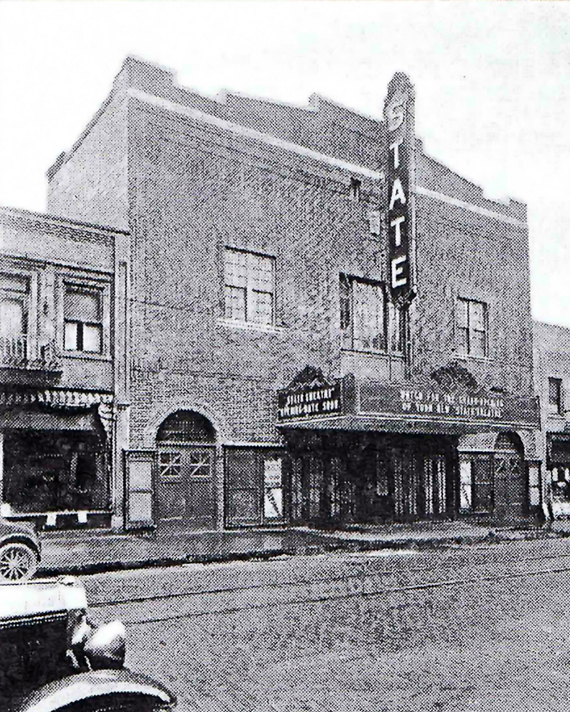
Also known as McKinley Theater, Strand Theater Add to favorites Add to favorites State Theater East Liverpool, OH 621 Saint Clair Avenue , East Liverpool, OH 43920 United States (map) Status: Closed Screens: Single Screen Style: Unknown Function: Unknown Seats: 850 Chain: Unknown Architect: Unknown Firm: Unknown Add a photo for this theater! Opened as the McKinley Theater in 1914. Within a year the name was changed to the Strand Theater. In the late-1920's the name was changed to the State Theater. The State Theater closed around 1970.
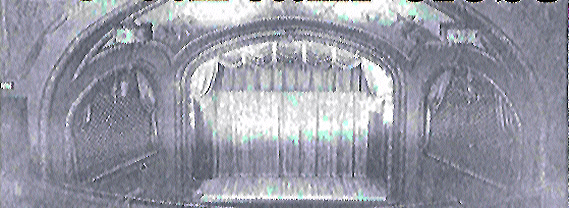
The ghostly image of the former State Theater Stage area. There is an original pf this picture and we hope to be able to scan it. In the meantime the ghost of it is kind of nice as well.
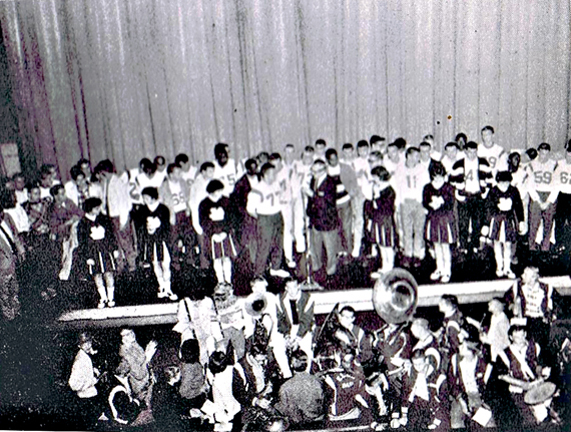
A ELHS Potters football pep rally in the early 1960s.
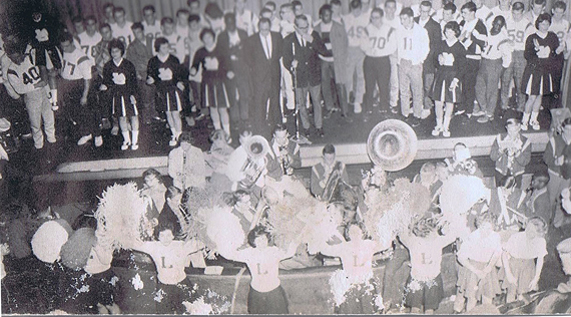
A ELHS Potters football pep rally in the early 1960s.
"State" Passes Into Past
By Robert Popp
East Liverpool Review, Nov. 11, 1972
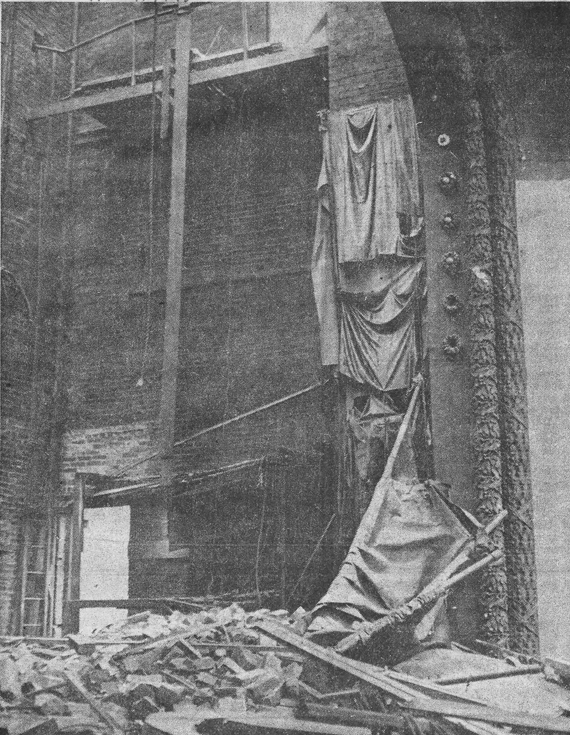
BRICK RUBBLE, tattered drapes and empty light sockets in the State Theater's arched proscenium symbolize the final days of the former stageand film center in this photograph taken by Ann Triguba of the Review Staff. (The Review, November 11, 1972)
The old State Theater is dying as she lived, a second class citizen in East Liverpool's stage family, now virtually unmourned and unnoticed as she crumbles into a pile of broken bricks and shattered concrete under the wrecker's hammer.
For the State, though her marquee shimmered brightly on lower St. Clair Ave. for many years, never was to attain the status that the Ceramic Theater enjoyed throughout her 59-year life.
Theater buffs leaped to arms all over the area 10 years ago when the city proposed to tear down the venerable Ceramic. With a catch of nostalgia in their voices and a tear sometimes shimmering in their eye, they recalled many a memorable experience in the red plush interior of the Ceramic. But not a soul ventured to step forward to decry the demise of the State. In the face of impending death, as in her heyday, She had many acquaintances but too few friends.
LIKE A MUCH widowed and aging woman, the State went through a succession of names. Few today can remember her "maiden name" affixed when she, wat erected 50 to 60 years ago of stout reinforced c o ncrete and brick.
H. B. Barth, curator of the East Liverpool Historical Society Museum, an afficianado of the legitimate stage and a onetime Shakespearean player, concedes that the old State never attained the status enjoyed by her more fashionable and beautiful sister, the Ceramic.
"The Ceramic was always the first-run house," he said, referring to motion picture days. "The State catered more to second runs from production companies that were not always first rank."
The theater first saw the light of day as the McKinley. She was built by Col. John Walsh, then the proprietor of the Walsh Hotel, which still stands on E. 6th St.
She became the Strand some years later, then she was sold to a syndicate that operated a chain of theaters in western New York and Pennsylvania. Closed for the last three or four years, she was owned by the East Liverpool Theater Corp., operated by Tom and George Anas of Weirton.
MIKE PUSATERI, the excavating contractor who purchased the theater in mid - October, is razing the towering structure. He expects to use the site temporarily for parking until amore suitable use is found.
"Col. Walsh was a very distinguished gentleman with flowing grey hair who always sported a Prince Albert coat and soft hat," Barth remembers. "He made a very imposing appearance. He was known everywhere as a very staunch Demobcrat."
Barth recalls that a private home stood on the site before de the theater was built.
"It housed the legitimate theater in its early days," Barth recalls. "Later it played vaudeville and finally it became a movie house, like all the other theaters."
He called the theater "very well planned and very substantially constructed."
"The stage was small, but it was good and competent," he said with the insight of an old trouper. "The acoustics were excellent, and you had a good view of the stage from any place in the house."
Barth's current research into the history of the State is hampered by the fact he gave his collection of 3,000 theater programs to the Hillman Library in Pittsburgh a few years ago.
BUT ONE of his scrapbooks contains two tickets to the old theater when it was known as the Strand.
Municipal Judge John B. McDonald, who was reared on Lincoln Ave., recalls playing in the area around the old theater when it was called the Strand.
Barth recalls attending the last leigtimate stage presentation at the State. It was "Tobacco Road," with a New York Company. "I can see it now," he said.' "Jeeter Lester sat on the steps of the family's shack at sundown. He gave a gigantic belch. And then he said: `Goddam the turnips,' as the curtain fell on the second act."
I can see it now," he said.' "Jeeter Lester sat on the steps of the family's shack at sundown. He gave a gigantic belch. And then he said: `Goddam the turnips,' as the curtain fell on the second act."
In the slow task of razing the sturdy structure, the interior virtually has been gutted and- with the roof removed-stands open to the sky. The towering proscenium arch, with its rococo decorations, still sweeps around the front of the stage. The red carpet in the inner lobby is covered with broken plaster and all manner of debris
No pedestrian pauses to gaze at the stark, ravaged interior and conjure up fond memories. No souvenir hunters paw through the debris for a momento of former glories. Like s senile old man whose life spark fades away in a nursing home, the State was forgotten before she died.
This site is the property of the East Liverpool Historical Society.
Regular linking, i.e. providing the URL of the East Liverpool Historical Society web site for viewers to click on and be taken to the East Liverpool Historical Society entry portal or to any specific article on the website is legally permitted.
Hyperlinking, or as it is also called framing, without permission is not permitted.
Legally speaking framing is still in a murky area of the law though there have been court cases in which framing has been seen as violation of copyright law. Many cases that were taken to court ended up settling out-of-court with the one doing the framing agreeing to cease framing and to just use a regular link to the other site.
The East Liverpool Historical Society pays fees to keep their site online. A person framing the Society site is effectively presenting the entire East Liverpool Historical Society web site as his own site and doing it at no cost to himself, i.e. stealing the site.
The East Liverpool Historical Society reserves the right to charge such an individual a fee for the use of the Society’s material.